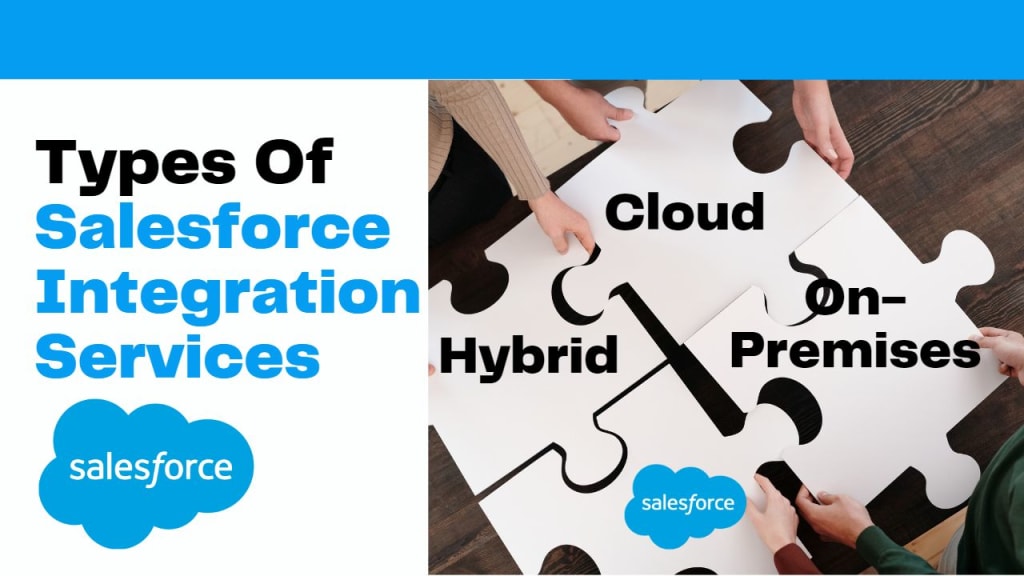Types of Salesforce Integration Services
Discover different types of Salesforce Integration Services and choose that best suits your business needs.

Salesforce Integration Services: Cloud, On-Premises, Hybrid
Salesforce is a powerful cloud-based customer relationship management (CRM) platform that allows businesses to manage their customer data and interactions more effectively. However, to get the most out of Salesforce, it's often necessary to integrate it with other systems and applications. Salesforce offers several integration services that businesses can use to integrate Salesforce with other systems, and these integration services can be broadly classified into three types: Cloud, On-Premises, and Hybrid. In this article, we'll take a closer look at these three types of Salesforce integration services.
Cloud Integration Services
Cloud integration services are hosted in the cloud and allow businesses to connect Salesforce with other cloud-based systems and applications. These integration services typically use APIs to connect to Salesforce and other cloud-based systems, making it easy to build and manage integrations without requiring significant IT resources.
Salesforce offers several cloud integration services, including Salesforce Connect, which allows businesses to connect to external data sources and view that data within Salesforce, and Salesforce AppExchange, which allows businesses to connect to third-party applications and services that are built on the Salesforce platform.
One of the key advantages of cloud integration services is that they are easy to set up and maintain, and they can be quickly scaled up or down as needed. Additionally, cloud integration services can be accessed from anywhere with an internet connection, making them an ideal choice for businesses that have remote teams or need to access their data on the go.
On-Premises Integration Services
On-premises integration services are installed and hosted locally, within a business's own IT infrastructure. These integration services typically require significant IT resources to set up and maintain, but they offer more control over the integration process and can be customized to meet specific business needs.
Salesforce offers several on-premises integration services, including Salesforce Connect for OData, which allows businesses to connect to on-premises data sources using the OData protocol, and Salesforce Connect for Lightning Connect, which allows businesses to connect to on-premises data sources using the Lightning Connect protocol.
One of the key advantages of on-premises integration services is that they offer more control over the integration process and can be customized to meet specific business needs. Additionally, on-premises integration services can be more secure than cloud integration services, since all data is hosted locally and not transmitted over the internet.
Hybrid Integration Services
Hybrid integration services are a combination of cloud and on-premises integration services. These integration services allow businesses to connect Salesforce with both cloud-based and on-premises systems and applications, providing the best of both worlds.
Salesforce offers several hybrid integration services, including Salesforce Connect for SAP, which allows businesses to connect to SAP systems and view that data within Salesforce, and Salesforce Connect for SharePoint, which allows businesses to connect to SharePoint and view that data within Salesforce.
One of the key advantages of hybrid integration services is that they allow businesses to leverage the benefits of both cloud and on-premises integration services. For example, businesses can use cloud integration services for their more lightweight integrations, while using on-premises integration services for their more complex integrations.
Conclusion
In conclusion, Salesforce offers several integration services that businesses can use to integrate Salesforce with other systems and applications. These Salesforce integration services can be broadly classified into three types: Cloud, On-Premises, and Hybrid.
By understanding the different types of Salesforce integration services, businesses can choose the integration services that best meet their needs and ensure that they are getting the most out of Salesforce.
For more help, connect with Salesforce Consulting Services provider today!
Also, check out how our Salesforce Implementation Services can help your business.
About the Creator
Harry Johnson
I am a Salesforce consultant and business analyst at Emorphis Technologies with a proven track record of success. I help businesses understand their requirements and translate them into Salesforce solutions.






Comments
There are no comments for this story
Be the first to respond and start the conversation.